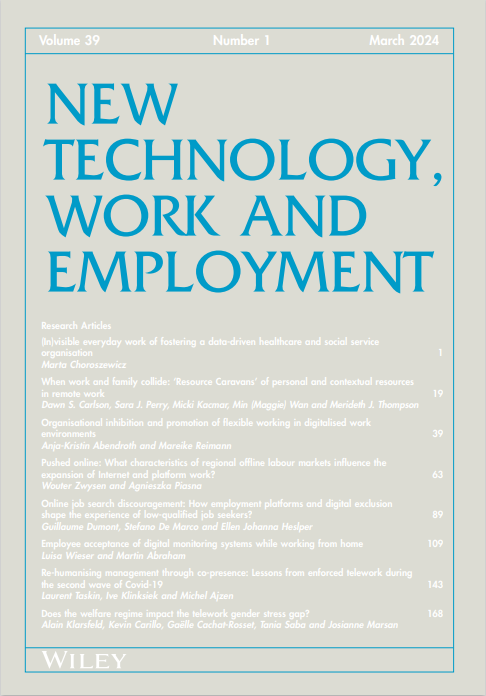Putting the university to work: The subsumption of academic labour in UK's shift to digital higher education
IF 4.5
3区 管理学
Q1 ERGONOMICS
引用次数: 2
Abstract
This paper considers how the formal and real subsumption of academic labour in UK higher education are exposed and exacerbated by the move towards online teaching, assessment and communication. These processes have been expedited by the COVID-19 pandemic outbreak and attention is drawn to the technology-driven organisational and operational innovations that are transforming academic divisions of labour and labour processes. These changes, particularly in relation to the separation of research and teaching, and to the deprofessionalisation, modularisation, and outsourcing of the latter, are the focus of the paper. We argue that the formal subsumption of knowledge production (research) through commercialisation dovetails with a real subsumption of socially reproductive work (teaching) that is undergoing qualitative transformation in an increasingly marketised higher education sector. We show how digitalisation actively contributes to the growing standardisation and flexibilisation of work, deepens long-standing gendered divisions of labour, and dissolves even further the blurred work/life boundaries for precariously employed workers. These new hallmarks of the contemporary subsumption present new challenges to workers and their collective organisations in Higher Education.让大学运转起来:英国向数字高等教育转变中对学术劳动的包容
本文考虑了英国高等教育中学术劳动的正式和真正的包容是如何被在线教学、评估和交流所暴露和加剧的。COVID-19大流行疫情加快了这些进程,并引起人们对技术驱动的组织和业务创新的关注,这些创新正在改变学术分工和劳动流程。这些变化,特别是在研究和教学分离方面,以及后者的去专业化、模块化和外包方面,是本文的重点。我们认为,通过商业化对知识生产(研究)的正式包容与在日益市场化的高等教育部门中正在进行质的转变的社会再生产工作(教学)的真正包容相吻合。我们展示了数字化如何积极促进工作的日益标准化和灵活性,深化长期存在的性别分工,并进一步消除不稳定就业工人模糊的工作/生活界限。这些当代包容的新特征对高等教育中的工人及其集体组织提出了新的挑战。
本文章由计算机程序翻译,如有差异,请以英文原文为准。
求助全文
约1分钟内获得全文
求助全文
来源期刊

New Technology Work and Employment
Multiple-
CiteScore
10.50
自引率
15.50%
发文量
36
期刊介绍:
New Technology, Work and Employment presents analysis of the changing contours of technological and organisational systems and processes in order to encourage an enhanced and critical understanding of the dimensions of technological change in the workplace and in employment more generally. The journal is eclectic and invites contributions from across the social sciences, with the primary focus on critical and non-managerial approaches to the subject. It has the aim of publishing papers from perspectives concerned with the changing nature of new technology and workplace and employment relations. The objective of the journal is to promote deeper understanding through conceptual debate firmly rooted in analysis of current practices and sociotechnical change.
 求助内容:
求助内容: 应助结果提醒方式:
应助结果提醒方式:


